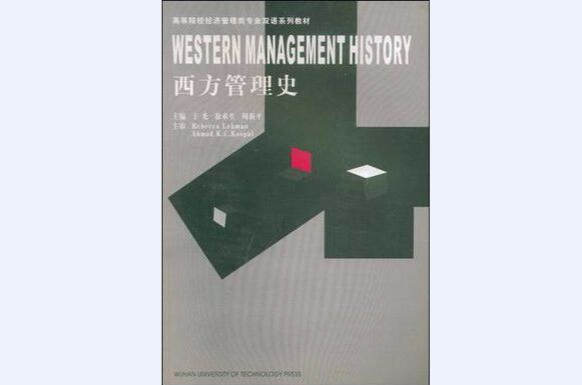《西方管理史》是2005年8月1日武漢理工大學出版社出版的圖書
基本介紹
- 中文名:西方管理史
- 出版社:武漢理工大學出版社
- 開本:16
- 平裝:487頁
基本信息,商品描述,內容簡介,目錄,
基本信息
出版社: 武漢理工大學出版社; 第1版 (2005年8月1日) 叢書名: 高等院校經濟管理類專業雙語系列教材 平裝: 487頁 正文語種: 中文, 英語 開本: 16 ISBN: 7562922381
商品描述
內容簡介
《西方管理史》的價值還在於這是一本用英語編寫的教材,不僅在最大程度上保留了西方文化的底蘊,也為讀者提高個人英語素養提供了有效的途徑。編者一方面期盼《西方管理史》能幫助讀者系統地學習西方管理思想,從中受到啟發教育,進而為發展適合我國國情的管理思想起到勢磚引玉的作用,另一方面也希望廣大學生和愛好者藉此機會直接感受英語語言的魅力,適應全球化時代文化交流的需要。
目錄
PART I The Earliest Beginning
1 Management in Ancient Civilizations
1.1 Prehistorical Times
1.2 Ancient Civilizations
1.2.1 Sumer
1.2.2 Egypt
1.2.3 Babylonia
1.2.4 Hebrews
1.2.5 Greece
1.2.6 Rome
Chapter Summary
Seminar Questions
Key Sentences
2 Management During the Middle Ages
2.1 Feudalism and the Middle Ages
2.2 Early Writings
2.3 The Revival of Commerce
2.3.1 Money Economy and the Growth of Financial Techniques
2.3.2 Guilds
2.4 The Merchants of Venice
2.5 The Arsenal of Venice
2.6 The Middle Ages Writers
2.6.1 Thomas Aquinas
2.6.2 Sir Thomas More
2.6.3 Niccolo Machiavelli
2.7 The Renaissance and the Reformation
2.7.1 The Renaissance
2.7.2 Protestantism and Economic Development
Chapter Summary
Seminar Questions
Key Sentences
3 A Managerial Awaking
3.1 Capitalism
3.2 Organizing for Production
3.2.1 Domestic System
3.2.2 Putting-out System
3.2.3 Factory System
3.3 The Industrial Revolution
3.3.1 The Industrial Revolution in England
3.3.2 Management Problems in the Early Factory
3.3.3 Cultural Consequences of the Industrial Revolution
3.4 Early Managerial Practices
3.4.1 The Cotton Industry and Richard Arkwright
3.4.2 Soho Foundry
3.4.3 New Lanark
3.5 Early Managerial Concepts
3.5.1 Adam Smith
3.5.2 Jean Baptiste Say
3.5.3 Robert Owen
3.5.4 Charles Babbage
3.5.5 Andrew Ure
3.6 Other Writers
3.6.1 Carl yon Clausewitz
3.6.2 Charles Dupin
3.6.3 W.S. Jevons
Chapter Summary
Seminar Questions
Key Sentences
PART II The Classical School of Management
Scientific Management
1.1 Introduction to Scientific Management
1.1.1 The Historical Background of Scientific Management
1.1.2 Pioneers of Scientific Management
1.2 Frederick Winslow Taylor and His Theory
1. 2.1 Frederick Winslow Taylor
1.2.2 F. W. Taylor's Practices
1. 3 Associates and Followers of Taylor's Doctrine
1.3.1 Carl G. Barth
1.3.2 Henry Laurence Gantt
1.3.3 The Gilbreths
1.3.4 Harrington Emerson
1.3.5 Morris Llewellyn Cooke
1.3.6 Louis D. Brandeis
1.3.7 Edward A. Filene
1.3.8 Harlow Stafford Person
1.3.9 Henry Ford
Chapter Summary
Seminar Questions
Key Sentences
2 Administrative Management
2.1 The Birth of Administrative Management
2.1.1 The Background of Administrative Management
2.1.2 The Significance of Administrative Management
2.2 Henri Fayol and Administrative Management
2.2.1 Henri Fayol
2.2.2 Mining the Theory
2.2.3 The Need for Administrative Management Theory
2.2.4 Five Elements of Management
2.2.5 Fourteen General Principles
2.2.6 A Further Comment
2.3 Writers and Concepts in France
2.3.1 Henri-Loius Le Chatelier
2.3.2 The Michelin Brothers
2.3.3 Charles de La Poix de Freminville
2.3.4 Emile Durkheim
2.3.5 Raoul Dautry
Chapter Summary
Seminar Questions
Key Sentences
3 Bureaucracy Management
3.1 Birth of Bureaucracy Management
3.1.1 Needs of Bureaucracy Management
3.1.2 The Signification of Bureaucracy Management
3.2 Max Weber and His Concepts
3.2.1 Max Weber's Life
3.2.2 Types of Authority
3.2.3 The Elements of Bureaucracy
3.2.4 Importance and Influence of Bureaucracy
3.3 Contemporary Theorists and Practitioners
3.3.1 Walther Rathenau
3.3.2 Carl Kottgen
3.3.3 Kurt Hegner
3.3.4 Friedrich-Ludwig Meyenberg
3.3.5 Paul Goehre and Henri DeMan
Chapter Summary
Seminar Questions
Key Sentences
4 Offshoots of Classic Management
4.1 Management Education
4.1.1 John Richard and Dexter Kimball
4.1.2 Harlow Stafford Person
4.1.3 Clarence Bertrand Thompson
4.1.4 Hugo Diemer
4.1.5 Leon Pratt Alford
4.2 The Impact on Accounting
4.2.1 John C. Duncan
4.2.2 Alexander Hamilton Church
4.2.3 James O. McKinsey
4.3 Classic Management in the Countries of Europe
4.3.1 Classic Management in Great Britain
4.3.2 Classic Management in Poland
4.3.3 Classic Management in U. S. S. R
4.4 Industrial Psychology
4.5 Office Management
4.5.1 Carl C. Parsons
4.5.2 William H. Leffingwell
4.6 Enterprise Management
4.6.1 DuPont and General Motors Corporation (GM)
4.6.2 Alfred Pritchard Sloan Jr.
4.6.3 James Hartness
4.7 Controversy on Scientific Management
4.7.1 Robert Franklin Hoxie
4.7.2 Horace Bookwalter Drury
Chapter Summary
Seminar Questions
Key Sentences
PART III On Behavior——-Western Management Theories of Behavioral Sciences
1 Behavioral Sciences Theories
PART Ⅳ The Modern Era Contemporary Western Management Theory
1 The Social System School
2 Decision Theory School
3 The Theory of Systems Management
4 The Empirical School
5 The Contingency (Situational) Approach
6 Management Science
Supplementary Reading
Appendix
Appendix Ⅰ (附錄Ⅰ)
Appendix Ⅱ (附錄Ⅱ)
Appendix Ⅲ (附錄Ⅲ)

